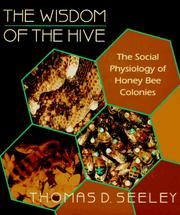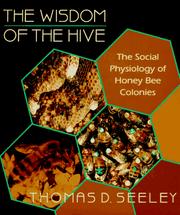| Listing 1 - 10 of 31 | << page >> |
Sort by
|

ISBN: 0674953762 Year: 1995 Publisher: Cambridge Harvard university press
Abstract | Keywords | Export | Availability | Bookmark
 Loading...
Loading...Choose an application
- Reference Manager
- EndNote
- RefWorks (Direct export to RefWorks)
This book is about the inner workings of one of nature's most complex animal societies: the honey bee colony. It describes and illustrates the results of more than fifteen years of elegant experimental studies conducted by the author. In his investigations, Thomas Seeley has sought the answer to the question of how a colony of bees is organized to gather its resources. The results of his research--including studies of the shaking signal, tremble dance, and waggle dance, and other, more subtle means by which information is exchanged among bees--offer the clearest, most detailed picture available of how a highly integrated animal society works. By showing how several thousand bees function together as an integrated whole to collect the nectar, pollen, and water that sustain the life of the hive, Seeley sheds light on one of the central puzzles of biology: how units at one level of organization can work together to form a higher-level entity.In explaining why a hive is organized the way it is, Seeley draws on the literature of molecular biology, cell biology, animal and human sociology, economics, and operations research. He compares the honey bee colony to other functionally organized groups: multicellular organisms, colonies of marine invertebrates, and human societies. All highly cooperative groups share basic problems: of allocating their members among tasks so that more urgent needs are met before less urgent ones, and of coordinating individual actions into a coherent whole. By comparing such systems in different species, Seeley argues, we can deepen our understanding of the mechanisms that make close cooperation a reality.
Honeybee --- Behavior --- Food --- 638.124 --- The bee colony as a whole, as an organism. Social behaviour of honeybees. The hive-mind, corporate personality. Spirit of the beehive --- Behavior. --- Food. --- 638.124 The bee colony as a whole, as an organism. Social behaviour of honeybees. The hive-mind, corporate personality. Spirit of the beehive --- Insects. Springtails --- Animal ethology and ecology. Sociobiology --- Plant and Crop Sciences Apiculture -- Bee Physiology and Behaviour --- ALLW. --- Bee culture. --- Apis mellifera --- European honeybee --- Hive bee --- Honey bee --- Apis (Insects) --- Bees --- Bee culture
Book
ISBN: 9780691147215 0691147213 Year: 2010 Publisher: Princeton Princeton university
Abstract | Keywords | Export | Availability | Bookmark
 Loading...
Loading...Choose an application
- Reference Manager
- EndNote
- RefWorks (Direct export to RefWorks)
"Honeybees make decisions collectively---and democratically. Every year, faced with the life-or-death problem of choosing and traveling to a new home, honeybees stake everything on a process that includes collective fact-finding, vigorous debate, and consensus building. In fact, as world-renowned animal behaviorist Thomas Seeley reveals, these incredible insects have much to teach us when it comes to collective wisdom and effective decision making. A remarkable and richly illustrated account of scientific discovery, Honeybee Democracy brings together, for the first time, decades of Seeley's pioneering research to tell the amazing story of house hunting and democratic debate among the honeybees." "In the late spring and early summer, as a bee colony becomes overcrowded, a third of the hive stays behind and rears a new queen, while a swarm of thousands departs with the old queen to produce a daughter colony. Seeley describes how these bees evaluate potential nest sites, advertise their discoveries to one another, engage in open deliberation, choose a final site, and navigate together---as a swirling cloud of bees---to their new home. Seeley investigates how evolution has honed the decision-making methods of honeybees over millions of years, and he considers similarities between the ways that bee swarms and primate brains process information. He concludes that what works well for bees can also work well for people: any decision-making group should consist of individuals with shared interests and mutual respect, a leader's influence should be minimized, debate should be relied upon, diverse solutions should be sought, and the majority should be counted on for a dependable resolution." "An impressive exploration of animal behavior, Honeybee Democracy shows that decision-making groups, whether honeybee or human, can be smarter than even the smartest individuals in them."--BOOK JACKET.
Honeybee --- Insect societies --- Sociétés d'insectes --- Behavior --- insect societies --- 634.9 --- bijen (lt) --- 595.7 --- Insects, Social --- Social insects --- Animal societies --- Insects --- 595.7 Insecta (Hexapoda). Insects. Entomology --- Insecta (Hexapoda). Insects. Entomology

ISBN: 0674043405 9780674043404 9780674953765 0674953762 0140263098 9780140263091 Year: 2022 Publisher: Cambridge, MA
Abstract | Keywords | Export | Availability | Bookmark
 Loading...
Loading...Choose an application
- Reference Manager
- EndNote
- RefWorks (Direct export to RefWorks)
This book describes and illustrates the results of more than fifteen years of elegant experimental studies conducted by the author to investigate how a colony of bees is organized to gather its resources. The results of his research--including studies of the shaking signal, tremble dance, and waggle dance--offer the clearest, most detailed picture available of how a highly integrated animal society works.
Honeybee --- Apis mellifera --- European honeybee --- Hive bee --- Honey bee --- Apis (Insects) --- Bees --- Bee culture --- Food. --- Behavior.
Book
ISBN: 9781400857876 1400857872 0691611343 0691639353 Year: 2014 Publisher: Princeton, NJ
Abstract | Keywords | Export | Availability | Bookmark
 Loading...
Loading...Choose an application
- Reference Manager
- EndNote
- RefWorks (Direct export to RefWorks)
The book presents honeybees as a model system for investigating advanced social life among insects from an evolutionary perspective.Originally published in 1985.The Princeton Legacy Library uses the latest print-on-demand technology to again make available previously out-of-print books from the distinguished backlist of Princeton University Press. These editions preserve the original texts of these important books while presenting them in durable paperback and hardcover editions. The goal of the Princeton Legacy Library is to vastly increase access to the rich scholarly heritage found in the thousands of books published by Princeton University Press since its founding in 1905.
Insects --- Honeybee --- Apis mellifera --- European honeybee --- Hive bee --- Honey bee --- Apis (Insects) --- Bees --- Bee culture --- Ecology.
Book
ISBN: 0691083916 0691083924 Year: 1985 Publisher: Princeton, N.J. : Princeton University Press,
Abstract | Keywords | Export | Availability | Bookmark
Book
ISBN: 9780691166766 Year: 2019 Publisher: Princeton, N.J. Princeton University Press
Abstract | Keywords | Export | Availability | Bookmark
 Loading...
Loading...Choose an application
- Reference Manager
- EndNote
- RefWorks (Direct export to RefWorks)
Book
ISBN: 9780691191409 9780691170268 Year: 2022 Publisher: Princeton, N.J. Princeton University Press
Abstract | Keywords | Export | Availability | Bookmark
 Loading...
Loading...Choose an application
- Reference Manager
- EndNote
- RefWorks (Direct export to RefWorks)
Book
ISBN: 9780691189383 Year: 2019 Publisher: Princeton, NJ
Abstract | Keywords | Export | Availability | Bookmark
 Loading...
Loading...Choose an application
- Reference Manager
- EndNote
- RefWorks (Direct export to RefWorks)
Book
ISBN: 9781400835959 Year: 2010 Publisher: Princeton, NJ
Abstract | Keywords | Export | Availability | Bookmark
 Loading...
Loading...Choose an application
- Reference Manager
- EndNote
- RefWorks (Direct export to RefWorks)
Book
ISBN: 9781400841165 Year: 2010 Publisher: Princeton, NJ
Abstract | Keywords | Export | Availability | Bookmark
 Loading...
Loading...Choose an application
- Reference Manager
- EndNote
- RefWorks (Direct export to RefWorks)
| Listing 1 - 10 of 31 | << page >> |
Sort by
|

 Search
Search Feedback
Feedback About UniCat
About UniCat  Help
Help News
News